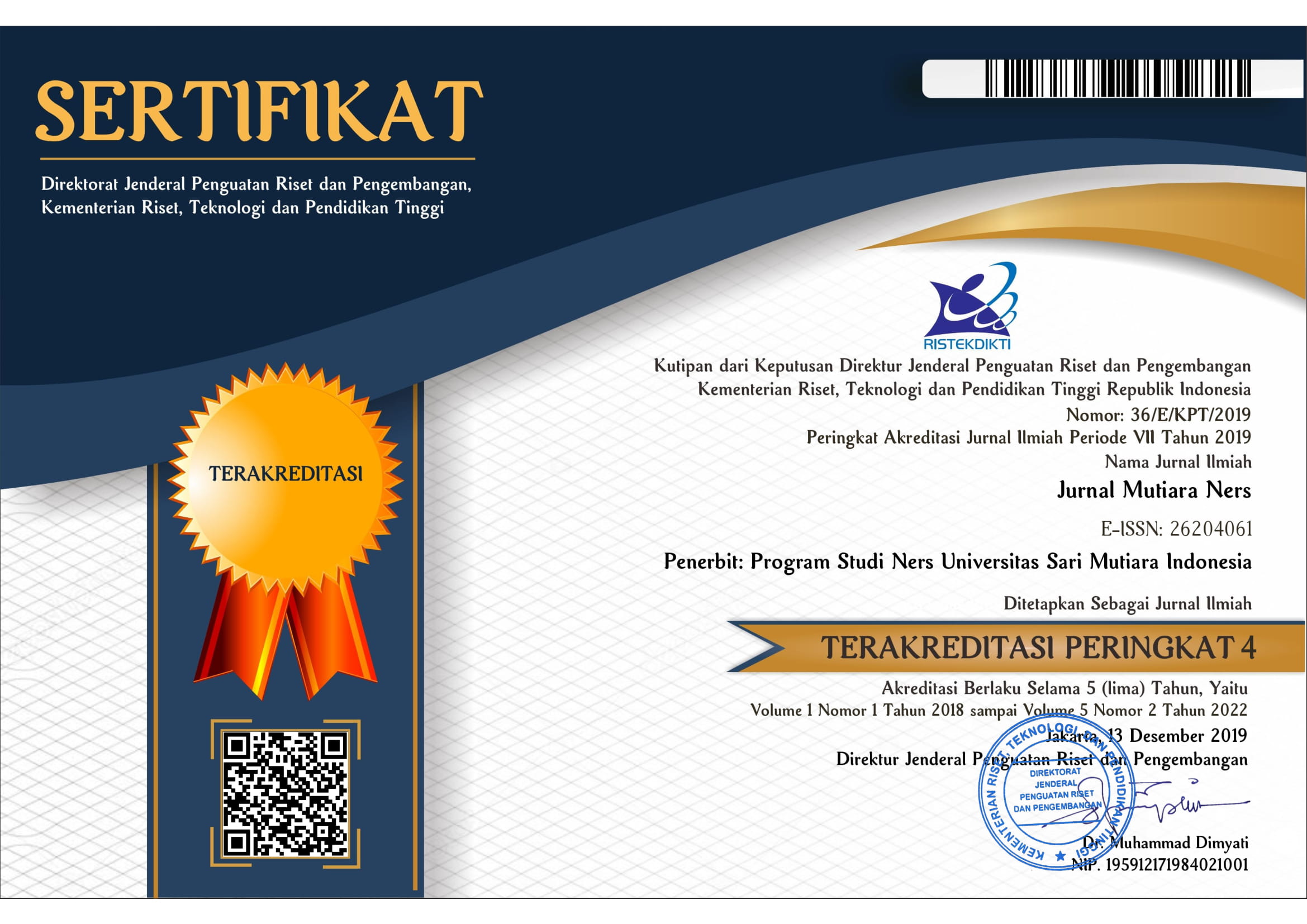SELFCARE IN RELATION TO DIETARY COMPLIANCE FOR NUTRITION AND FLUID AMONG PATIENTS UNDERGOING HEMODIALYSIS
indonesia
Keywords:
Dietary compliance, Fluid, Hemodialysis, Nutrition, Self CareAbstract
The dietary intake of nutrients and fluids holds paramount importance for patients afflicted with chronic kidney disease undergoing hemodialysis, as it significantly influences their overall well-being and quality of life. Mismanaged nutritional and fluid intake may lead to adverse clinical consequences, including the development of ascites and edema. Furthermore, inadequate implementation of a well-balanced nutritional and fluid regimen can result in the depletion of muscle and fat mass, thereby impacting the daily functioning of individuals grappling with chronic kidney disease. The correlation between patients' adherence to such dietary protocols and their ability to autonomously manage self-care further underscores the significance of this study. This quantitative research was conducted using a descriptive approach and a cross-sectional design to examine patient self-care and its alignment with nutritional and fluid diet adherence among chronic kidney disease patients undergoing hemodialysis. The study was conducted at Bakti Timah Hospital and Depati Hamzah General Hospital in Pangkalpinang. This research primarily measured the degree of Self Care exhibited by Patients with Chronic Kidney Disease Undergoing Hemodialysis in adherence to a prescribed Nutritional and Fluid Diet. The findings unveiled a majority of patients (82.2%) adhering to dietary intake of essential nutrients, particularly staple foods. Conversely, the assessment of side dish consumption revealed a considerable proportion (62.7%) in the non-adherent category. Similarly, the description of mineral and water intake highlighted a majority (50.8%) falling into the non-compliant segment. Conversely, vegetable and fruit intake garnered adherence from a substantial number of patients (68.6%). Moreover, the assessment of self-care adherence in relation to vitamin consumption displayed a significant level of compliance (64.4%). In general, the self-care adherence to diet, nutrition, and fluids in hemodialysis (68.6%) was within the non-adherent category.
Downloads
References
Anita, D. C., & Novitasari, D. (2017). KeCompliantan Pembatasan Asupan Cairan terhadap lama menjalani hemodialisa. Prosiding Seminar Nasional & Internasional, 1(1).
Badan Penelitian dan Pengembangan Kesehatan Kementrian RI. (2018). Riset Kesehatan Dasar (Riskesdas).
Biruete, A., Jeong, J. H., Barnes, J. L., & Wilund, K. R. (2017a). Modified nutritional recommendations to improve dietary patterns and outcomes in hemodialysis patients. Journal of Renal Nutrition, 27(1), 62–70.
Biruete, A., Jeong, J. H., Barnes, J. L., & Wilund, K. R. (2017b). Modified nutritional recommendations to improve dietary patterns and outcomes in hemodialysis patients. Journal of Renal Nutrition, 27(1), 62–70.
Britz, J. A., & Dunn, K. S. (2010). Self‐care and quality of life among patients with heart failure. Journal of the American Academy of Nurse Practitioners, 22(9), 480–487.
Haryono, R. (2013). Keperawatan Medikal Bedah : Sistem Perkemihan .
Heidarzadeh, M., Atashpeikar, S., & Jalilazar, T. (2010). Relationship between quality of life and self-care ability in patients receiving hemodialysis. Iranian Journal of Nursing and Midwifery Research, 15(2), 71.
Hermawati, H., & Silvitasari, I. (2020). PENGARUH SELF MANAGEMENT DIETARY COUNSELLING (SMDC) TERHADAP KUALITAS HIDUP PADA PASIEN HEMODIALISIS. Jurnal Keperawatan’Aisyiyah, 7(1), 39–47.
Kastrouni, M., Sarantopoulou, E., Aperis, G., Alivanis, P., & Kastrouni, M. (2010). QUALITY OF LIFE OF GREEK PATIENTS WITH END STAGE RENAL DISEASE UNDERGOING HAEMODIALYSIS. 126–132.
Masulili, F. S. (2017). FAKTOR-FAKTOR YANG BERHUBUNGAN DENGAN KECOMPLIANTAN PASIEN HEMODIALISA DALAM MENJALANI DIET DI RSUD UNDATA PALU. Jurnal Keperawatan Sriwijaya, 4(2).
Muhlisisn dan Irdawati. (n.d.). Teori Self care dari Orem dan Pendekatan Dalam Praktek keperawatan. Berita Ilmu Keperawatan ISSN 1979-2697, Volume 2 N, 97–100.
Padila. (2013). Asuhan Keperawatan Penyakit Dalam. Nuha medika.
Registry IR. (2018). 11th Report Of Indonesian Renal Registry.
Relawati, A. (2016). Gambaran Dietary Compliance Pada Penderita gagal Ginjal Kronis Di RSUD Tjidrowardoyo Purworejo. UMY Repository.
Rochim, E. N. (2019). Gambaran Self Care Pasien yang Menjalani Hemodialisa dalam Pengelolaan Diet dan Cairan di Ruang Hemodialisa RSI Sultan Agung Semarang. Unibersitas Sultan Agung Semarang.
saglimbene, valeria, Su, G., Wong, G., & Natale, P. (221 C.E.). Dietary intake in adults on hemodialysis compared with guideline recommendations. Journal Nephrol, 6.
Smeltzer, S.C., Bare, B.G., Hinkle, J.L., Cheever, K. H. (2010). Brunner and Suddarth’s Text Book of Medical Surgical nursing ((!!th ed)). Lippincolt Williams & Wilkins.
Wibowo, H. P. (2020). Hubungan inter dialitic weight gains (idwg) dengan terjadinya komplikasi durante hemodialisis pada pasien ginjal kronik. Jurnal Keperawatan Priority, 3(1), 13–22.
Published
How to Cite
Issue
Section
Copyright (c) 2023 Adiyati Diah, Zulkifli

This work is licensed under a Creative Commons Attribution-ShareAlike 4.0 International License.







.png)
